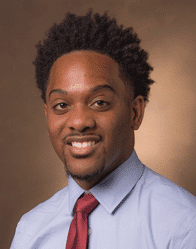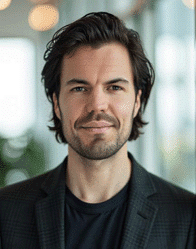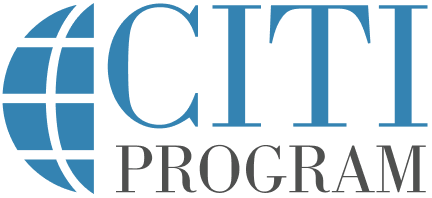Season 1 – Episode 34 – The Essential Role of Bioethics in HBCU Medical Schools
Discusses the need for bioethics departments in HBCU medical schools.
Podcast Chapters
Click to expand/collapse
To easily navigate through our podcast, simply click on the ☰ icon on the player. This will take you straight to the chapter timestamps, allowing you to jump to specific segments and enjoy the parts you’re most interested in.
- Introduction and Guest Background (00:00:03) Host introduces Dr. Donald Carter III, his background, and the episode’s focus on bioethics in HBCU medical schools.
- Dr. Carter’s Personal and Professional Journey (00:01:10) Dr. Carter shares his upbringing, education, and how he discovered and pursued a career in bioethics.
- Defining Bioethics and Clinical Medical Ethics (00:03:32) Dr. Carter explains the concepts of bioethics and clinical medical ethics, their principles, and their societal importance.
- Significance of Bioethics in Medical Training, Especially at HBCUs (00:06:05) Discussion on why bioethics is crucial in medical education, with emphasis on HBCU medical schools and cultural competence.
- Current State of Bioethics in Medical Curricula (00:09:36) Overview of how bioethics is currently taught in medical schools, accreditation requirements, and challenges in rural and underserved areas.
- Concerns in Undergraduate and Graduate Bioethics Education (00:11:40) Dr. Carter addresses the lack of sufficient bioethics education and the need for critical thinking over memorization.
- Comprehensive Integration of Bioethics in Medical Education (00:14:02) Dr. Carter describes an ideal, integrated approach to bioethics education throughout all years of medical training.
- Long-Term Benefits of Comprehensive Bioethics Education (00:17:08) Exploration of the proactive benefits, including reduced harm, litigation, and improved patient care.
- Overcoming Challenges and Practical Tips for Implementation (00:18:18) Advice on addressing resource and staffing challenges, and strategies for gradually building bioethics programs.
- Recommended Resources for Learning More (00:20:32) Dr. Carter suggests organizations, journals, blogs, and podcasts for further exploration of bioethics.
- Final Thoughts and Importance of Collaboration (00:21:48) Emphasis on the value of interdisciplinary collaboration and communication in advancing bioethics.
Episode Transcript
Click to expand/collapse
Daniel Smith: Welcome to On Tech Ethics with CITI Program. Our guest today is Dr. Donald Carter III, who is a biomedical ethicist and assistant professor at Mercer University School of Medicine. He holds degrees from Fisk, Tennessee State, Vanderbilt, and Loyola Chicago. A 2023 Hastings Center Sadler Scholar, his research explores clinical ethics, AI in medicine, race and social justice. Today we are going to discuss the need for bioethics departments in HBCU medical schools. Before we get started, I want to quickly note that this podcast is for educational purposes only. It is not designed to provide legal advice or legal guidance. You should consult with your organization’s attorneys if you have questions or concerns about the relevant laws and regulations that may be discussed in this podcast. In addition, the views expressed in this podcast are solely those of our guests. On that note, welcome to the podcast, Donald.
Dr. Donald Carter III: Thank you so much. I’m happy to be here.
Daniel Smith: It’s great to have you. I briefly introduced you, but can you just tell us some more about yourself and your work at Mercer University School of Medicine?
Dr. Donald Carter III: Absolutely. I was born and raised in Fort Smith, Arkansas, which is on the border of Arkansas and Oklahoma. Although I grew up in what was considered the second-largest city at the time, because I don’t know exactly where it falls now, I grew up adjacent to rural areas. In fact, my father was a respiratory therapist, and he would travel to the rural areas to change and to clean the trachs for the patients. He would take me with him instead of going to daycare. I would also accompany him to the hospital acting as his special helper and carrying his stethoscope as he worked with the patients. That was my introduction into healthcare and medicine. When I got older and decided to go to school, I went out to Nashville, and as you previously stated, got my BA from Fisk University. A couple of years later a MBA from Tennessee State University.
I found myself in a Master of Divinity program. It was that program that required me to take an ethics course. That course was paired with the divinity students, the medical students, and some graduate students from the educational program. That was the first time that I had ever heard of bioethics, and my mind was just blown. They gave us case studies and allowed us to, based on our disciplines, discussed how we felt we should best take care of the patient. It was just amazing how we all had the goal of wanting to do what was best, but we all approached it differently based on how we had been trained to see life and to deal with the people. After that program, I needed to know, how do I get into this? How do I make this my career?
They said, “No, it’s bioethics.” That’s what led me to Loyola, the University of Chicago to pursue a doctorate of bioethics. I haven’t looked back since. I’m now an assistant professor at Mercer, just finishing up my second year of teaching bioethics to the medical students. I also have the pleasure of working with our local hospitals with their ethics committees for training purposes, but also just to be a liaison and a bridge from the medical school over into the community so that the school also has a presence within our community. As far as my research interest, as you previously stated, and I’m interested in so many things, but it has been clinical medical ethics, transplant, race and social justice, and medical humanities.
Daniel Smith: Thanks, Donald. You mentioned bioethics and clinical medical ethics, which are broad terms. Just to give our listeners some background information, can you briefly define what bioethics and clinical medical ethics entail?
Dr. Donald Carter III: Sure. Bioethics helps us as a society determine what is moral and what is just as it relates to difficult decisions that impact us as humans. I say society because when we think about morals, morals are usually individualistic where ethics is more of a larger sense of what we as a community think, what we as a group think. You wouldn’t say that the business was immoral, you would say they were unethical. Right? But you’ll say that the individual was immoral. When we think of bioethics, it’s more about how we think of as a society as a whole. It’s about what is impacting humans, hence the idea of bio in front of ethics. It uses four principles to help guide us in navigating conversations and debates. Those principles that we use are usually autonomy, beneficence, non-maleficence and justice. While we always think of bioethics as relating to medicine and research, it can also be applied to environmental and animal kingdom issues.
When we talk about clinical ethics, that is the ethics that happens within the clinical space. But again, ethics as itself, bioethics as itself, it deals with anything that impacts the lives of humans. We are usually the people who are always asking the tough questions, complex questions concerning whether we should be doing that or this, and if so, why and how? As technology and science progress, we find ourselves in constant conversations and debates about how do we move forward as a society? We are also part of why researchers must go through the institutional review board while they’re doing research, whether they like it or not. The IRB requirement was born out of a response of inhumane treatment to human subjects in research. It’s important to think of bioethics not as the moral police, but instead of as a toolbox or a framework to help identify and navigate ethical dilemmas.
Daniel Smith: Absolutely. I think that’s a wonderful way to describe it. You mentioned that you first encountered and quickly connected with bioethics when you were in school. Can you talk some more about the significance of addressing bioethics in medical training and particularly at HBCU medical schools?
Dr. Donald Carter III: When it comes to the significance of addressing bioethics, every day each of us deals with some form of ethical dilemma, whether we are conscious of it or not. Depending on our lives and professions, some of us may deal with them several times a day. However, very few of us deal with those that may change the course of someone else’s life forever. Very few of us face decisions that could mean life or death for those involved. Many patients do not have family or friends to help them make a decision or convey what it is that they desire if they can’t speak for themselves. Patients and research subjects don’t know what to ask, or often blindly trust doctors and researchers. Thus, researchers and doctors are in a sense powerful, and with that comes a great responsibility. Medical schools have four years to take a student who’s usually only have an undergraduate degree, and we have to prepare them for the rigorous of making life-altering decisions.
Yet so much of medical school is about labs and science, and for the most part, memorization. Bioethics is striving to bring humanity back into the fold, back into the conversation. We are attempting to remind the students that each patient isn’t just a medical record number, but an actual person, someone who has dreams, goals, family feelings. Thus, it is vital that we see them, that we do our best to get to know them, to try to understand them. It’s not just about what the doctor wants for the patient. This isn’t a paternalistic profession, but one of collaboration and servitude to everyone, especially those most vulnerable. Now, as it relates to HBCU medical schools, as you’ve mentioned, I recently wrote an article about the need for bioethics departments in them. In my research for publication, I discovered that 70% of Black doctors in the US attended an HBCU at some point in their path to becoming physicians.
Yet, none of the HBCU medical schools have a bioethics department. That’s Charles Drew, Howard, Morehouse, Meharry, and soon to be Xavier University in New Orleans. Howard does have a center, but to my understanding, it focuses exclusively just on policy and not just really the practice of clinical ethics. There are many things that can be said about why it’s important that these specific institutions address bioethics, but for the sake of time, I’ll limit them to about two. Cultural competence, which some have moved to say cultural humility, and justice as it relates to access. Research shows that about 5.7% of our nation’s doctors are Black, but 70% of them are touching HBCUs. Integrating bioethics and medical humanities departments into those institutions is significant because of the number of students that it is actually touching. It’s also important because it helps to promote a culturally competent healthcare system sensitive to the racial and ethnic health disparities that we’re all aware of. There’s an opportunity to make a great difference there.
Daniel Smith: I’d love to hear more about what a more comprehensive approach to embedding bioethics is. But before we get to that, I’d like to hear a bit more about how bioethical issues are typically addressed in medical school curricula. Then also, what are some of the current concerns of how bioethics are currently addressed in undergraduate and graduate school programs?
Dr. Donald Carter III: Sure. Traditionally, medical schools have a course or two that mentions bioethics. The Association of American Medical Colleges, known as the AAMC, it requires medical school graduates to demonstrate a commitment to ethical principles regarding providing or withholding care, confidentiality and informed consent. The Liaison Committee of Medical Education, known as LCME, which serves as the primary accrediting body for medical schools, it requires medical schools in the US to include instruction in medical ethics and human values as part of the curriculum. However, they don’t specify particular content areas like the AAMC. At best, all students are required to learn three things, and that is providing or withholding care, confidentiality and informed consent. Fortunately, places like Mercer understand that our future medical professionals will encounter more than just dilemmas in these three areas. Institutions like us have consciously integrated ethics throughout their curriculum, understanding how we think about things such as brain death, pediatric disability, and reproductive ethics, or even how we teach students to deliver bad news.
All these things are essential. Unfortunately, as important as it is, I would be remiss not to say that it’s not that all institutions do not wish to offer more learning opportunities, but it’s the lack of resources. Our rural areas tend to be some of the most underserved, and they usually have unique challenges that urban areas do not. For example, Mercer’s mission is to help rural and medically underserved people. We place a significant amount of focus on ethical issues prevalent in those areas, so when we talk about things like confidentiality. In small towns where there may only be one doctor, well, that doctor may also be your pastor, that doctor may also be something else on the side. How do we talk about confidentiality in that context? It’s going to be different for them because of their smaller populations.
Or when we talk about a family medicine doctor, in a small town, that doctor has to handle so many different things. But what happens when their patient really needs to see a specialist? It’s harder for them because the next doctor or the next clinic may be 70 to 90 miles away. Overall, every institution is addressing bioethics in their curriculum differently, and it seems to be based on their mission, the institution’s location and the available resources. Now, as it relates to concerns for undergraduate and graduate school programs, my primary concern is that bioethics is not being addressed enough. Bioethics is still fairly new, having only been around since the ’60s or early ’70s. However, the concept of ethics, it goes back to antiquity. The concept of non-maleficence borrows from Hippocrates, his belief that physicians or healers should do no harm, which we often find in the Hippocratic Oath.
As more and more teachers and professors are collaborating with bioethicists to try to find ways to integrate ethics into what they’re already teaching, we want to make sure that those students can work through issues and problems moving away from regurgitation towards critical thinking, because dilemmas can find themselves in so many different disciplines outside of medicine like science and technology. I tell my students that you can’t memorize your way through your career in its entirety. You have to embody these principles. Unfortunately, I can’t give you the solution to every problem that you’re going to face. However, I can help you navigate the landscape and help you to engage in conversations with tough questions that may lead you to those answers. It’s important that we get bioethics into these programs to ensure that the students have learned how to navigate ethical challenges because those things benefit not only the students, but the industries that these students are going to feed into later on.
Alexa McClellan: I hope you’re enjoying this episode of On Tech Ethics. If you’re interested in hearing conversations about the research industry, join me, Alexa McClellan for CITI’s other podcast called On Research with CITI Program. You can subscribe wherever you listen to podcasts. Now, back to the episode.
Daniel Smith: In terms of better integrating bioethics into these programs, what would a more comprehensive approach look like to you?
Dr. Donald Carter III: That’s a good question. I start with suggesting a continued integration. As previously stated, some programs have singular ethics courses within their third or fourth year in their curriculums. Integrating ethics content throughout all four years, allowing the content to increase in its complexity over the years, that would be ideal. This is something that we do at Mercer, and we’ve seen some great results. Years one and two should complement what is being taught to them in their classes and lectures, years three and four being the years that they spend in clinical clerkships that should be ethical information that speaks to and fosters moments for them to reflect on what they’re seeing during their rotations. Again, I can’t stress enough that critical thinking is essential in these professions. The use of case studies, patient stories, literature, they can all be useful in helping students reflect and practice having discussions amongst themselves.
Often students, they’ve never been asked their own personal opinions because so much of the curriculums that they’ve already been accustomed to expects them to memorize what others have said or what the philosophy of this scholar is or that scholar. As we are training students to become professionals, they need to be able to flex and strengthen their ability to think and process dilemmas within the safe space of the classroom where discussions won’t actually impact the life of someone. We do have simulations. Those are great tools to allow the teacher and professor to create mock ethics consultations. We call them IPE, which stands for interprofessional education, and we partner our medical students with other disciplines like nurses, physical therapists. There’s even conversations about wanting to do a partnership with theology school. Those within divinity schools, they may want to be chaplains. The idea is to create a safe environment, but make them as realistic as possible as to what a real situation would look like.
Then lastly, I would like to see bioethics within the residency programs just so that there is a continuous thread of training and guidance. Like I said earlier, I work with the ethics services at the local hospitals here, and it allows me to do presentations for them on areas of interest or areas that they may need additional instruction on. Those audiences include nurses, residents, doctors, anyone who wants to come through because these people are and should be lifelong learners. Partnerships with hospitals and clinics are a great opportunity to continue bioethics training for not only the medical students, but also the residents and then also the doctors.
Daniel Smith: As you look into the future, what do you think would be the long-term benefits of incorporating this more comprehensive approach to bioethics education?
Dr. Donald Carter III: That is a question that a lot of people would love the answer to. I believe this approach helps us be proactive instead of reactive as it relates to things such as moral distress. I think it also helps us anticipate the dilemmas that we may encounter. I also believe that it helps the students remain sensitive to their bias, helping them navigate conflicts and build better relationships with their patients. The biggest takeaway in my opinion, of course, is reduction of harm and definitely reduction in litigation. Nobody wants our students to find themselves in trouble with the law. Then I think it also helps to increase the quality of care that we’re giving our patients.
Daniel Smith: Absolutely. I think you already touched a bit on the challenges in terms of resourcing and things like that, but in light of recognizing the realities of those challenges and incorporating this more comprehensive approach, do you have any tips or guidance on how people could start doing this in a small way and build on it over time?
Dr. Donald Carter III: Sure. I have talked about some of the challenges as it relates to resources. I think when we talk about resources, we usually always think about funding, which it is a big portion, but also resources are people as well. Anyone who engages in ethics is technically an ethicist, but usually the requirement to seek employment in this field is a master’s degree, but a vast majority of the positions desire a terminal degree. We all know that that takes time and it takes money, so desiring upfront work and wages that don’t allow them to pay back their student loans is something that people are always concerned about. If we’re going to have the people to actually do this work, they’re going to need jobs and they’re going to need jobs that allow them to do the work and do the work in good quality, and to be able to teach the younger generations how to navigate these up and coming challenges and how to do so efficiently.
I think the other barrier is time. There’s so much that we like to expose our students to, but the curriculum at its core is already jam-packed and rigorous. It’s important that we be mindful and intentional of where we place things inside the curriculum. We’re always asking our students for feedback, which I think is our superpower. Of course, you have to worry through the why do we have to do this comments. But even with that, I think it’s important that we explain to students why we are teaching what we are teaching. We should remember that some of these students enter medical school around the age of 22, which is adults in the eyes of the law, but very much inexperienced as relates to life.
Some of them have never even experienced the death of a loved one at that age. In medicine death is a portion of the job, and so some struggle there. Us being flexible and good stewards of time management as educators is key. I admit, and I’m sure that maybe other educators would agree as well, that we don’t always get it right, but we are always willing to adjust and fine-tune what it is that we’re doing. Medicine and the world are always changing, and so I think it’s important that we keep a pulse on that to ensure that we don’t become outdated.
Daniel Smith: Absolutely. For folks who want to learn more, do you have any recommendations for additional resources that they can check out?
Dr. Donald Carter III: Sure. Thank you for asking this question. The Hastings Center is an excellent place for information. It addresses things like social and ethical issues in science, technology and of course healthcare. If you’re looking for a more formal place to find resources, you can start with the American Journal of Bioethics. There’s also a blog that is a little less formal, but still has a very good wealth of knowledge within it. It’s called Bioethics Today. All these things can be Googled and can be found. Then of course there are podcasts like this, of course, but also Bioethics in the Margins and Bioethics for the People. Those two podcasts are doing a very good job at discussions and putting ideas out there that really get your mind going, but also too introducing you to people within the field who are actually doing the work.
Daniel Smith: Wonderful. I’ll certainly include links to all of those resources in our show notes so their listeners can easily access them. My last question for today, Donald, is just do you have any final thoughts that we’ve not already touched on?
Dr. Donald Carter III: Nothing that we haven’t touched on, but I would just like to reiterate the importance of collaboration. Thank you for allowing me to be here. Platforms like this are essential because they allow us to speak with and to people from different backgrounds. In a time of rampant technological advancement, conversations amongst people, human to human is even more needed because of the tendency to become siloed, too narrowly focused on our personal work within our fields. Right? There is so much overlap and opportunities to do great things, but collaboration, it requires communication. I’m so glad to have the opportunity to sit with you today and to discuss what’s going on in bioethics and our desire to work with each and every one across several different fields across several different industries.
Daniel Smith: It was wonderful having you, Donald. I really enjoyed hearing your perspective and learning about your research that you did for your recent paper and everything else that we discussed. Thank you again.
Dr. Donald Carter III: Thank you.
Daniel Smith: I also invite everyone to visit citiprogram.org to learn more about our courses, webinars, and other podcasts. Of note, you may be interested in our Bioethics and Healthcare Ethics Committee courses. That is all for today. I just want to give a last special thanks to our line producer, Evelyn Fornell and production and distribution support provided by Raymond Longaray and Megan Stuart.
How to Listen and Subscribe to the Podcast
You can find On Tech Ethics with CITI Program available from several of the most popular podcast services. Subscribe on your favorite platform to receive updates when episodes are newly released. You can also subscribe to this podcast, by pasting “https://feeds.buzzsprout.com/2120643.rss” into your your podcast apps.
Recent Episodes
- Season 1 – Episode 33: Integrating AI into Healthcare Delivery
- Season 1 – Episode 32: Modernizing Clinical Trials with ICH E6(R3)
- Season 1 – Episode 31: Fostering AI Literacy
- Season 1 – Episode 30: Importance of Data Privacy Compliance and ESG Reporting
Meet the Guest

Donald Carter, DBe, MDiv, MBA – Mercer University School of Medicine
Dr. Donald Carter III is a biomedical ethicist and Assistant Professor at Mercer University School of Medicine. He holds degrees from Fisk, Tennessee State, Vanderbilt, and Loyola Chicago. A 2023 Hastings Center Sadler Scholar, his research explores clinical ethics, AI in medicine, race, and social justice.
Meet the Host

Daniel Smith, Director of Content and Education and Host of On Tech Ethics Podcast – CITI Program
As Director of Content and Education at CITI Program, Daniel focuses on developing educational content in areas such as the responsible use of technologies, humane care and use of animals, and environmental health and safety. He received a BA in journalism and technical communication from Colorado State University.










